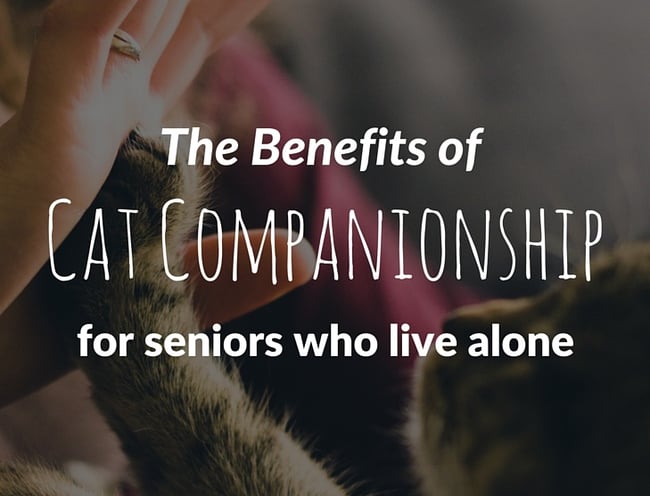
Social isolation can have a profound toll on older adults. Depression and loneliness set in, and physical health and cognitive sharpness decline. While there is no substitute for compassionate and stimulating human contact, having a pet can help a senior thrive. In fact having animal companionship can be so beneficial that an increasing number of retirement communities are inviting residents to bring their four-legged friends along with them, which is a win/win for everyone.
Although dogs are wonderful companions for many seniors, they require constant attention. Seniors who have physical limitations or a lower activity level may find a dog more stressful than relaxing. Cats, however, are independent and relatively self-sufficient by nature, and they offer just as much unconditional love and good company as dogs.
The American Humane Association lists three important reasons why adult cats are perfect companions for seniors in retirement communities:
- Cats are able to live indoors full-time.
- A half hour of daily playtime is plenty for an adult cat, and an elderly person can even play sitting down by using a kitty fishing pole or a laser toy.
- Cats sleep an average of 15 hours a day, and some sleep up to 20 hours in a 24-hour period, according to PetMD.
But there are also a number of health-related benefits for choosing feline companionship.
Mood Lifter
Research shows that within minutes of bonding with an animal, a chemical chain reaction in the brain lowers the stress hormone, cortisol, and increases the production of serotonin, the feel-good hormone. A cat is a wonderful antidote to depression and can bring an elderly person a renewed interest in life. Being needed by a pet gives purpose, and having an animal’s love and acceptance can build self-esteem. In the presence of pets, seniors are more physically active, more talkative, and smile more than when pets are not present. These animals have a wonderful way of helping people focus on the here and now.
Heart Healthy
Numerous studies indicate that seniors who share their lives with pets have lower blood pressure and cholesterol levels than their pet-less peers. They also have fewer doctor visits. Less psychological stress and anxiety, coupled with a lower heart rate, all help to reduce the risk for heart disease and stroke. A 10-year study of more than 4,000 Americans by researchers at the University of Minnesota's Stroke Institute in Minneapolis found that owning a cat can reduce the risk of a heart attack by nearly one third. Pet owners who had a heart attack enjoyed greater long-term survival rates than non-pet owners.
Activity Generator
Caring for a cat involves petting, brushing, scooping litter, feeding, and watering—all activities that provide routine and consistent mental stimulation a senior might not otherwise receive. It also helps distract them from ruminating on any challenging physical or emotional conditions they might be experiencing. An elderly person could be inspired to learn more about their feline companion and dive into research or reading. This provides additional mental stimulation and ongoing learning so vital for keeping the brain sharp. A pet may even help a senior with memory loss retrieve memories of past pets.
True Companionship
Cats provide physical, emotional, and social support during difficult times, and they are just as responsive to their owners as dogs. Cats are especially good company for women. A 2011 study published in the journal Behavioural Processes showed that far from being aloof, cats initiate contact with their owners much of the time. They seem to remember kindness shown to them and reciprocate later. Researchers found that cats were more likely to approach women than men and jump on their laps to seek contact more frequently. The bond of unconditional love shared with a cat can act as a bridge to open seniors up to increased socialization with the other residents in retirement communities.
Cats give so much and require so little, and every year 3.4 million of them end up in shelters across the country. Perhaps a senior you know might benefit from sharing life with a furry companion?












